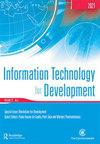Digital transformation for development: a human capital key or system of oppression?
IF 5.1
3区 管理学
Q1 DEVELOPMENT STUDIES
引用次数: 0
Abstract
ABSTRACT Digital transformation goes beyond digitalization to make radical changes to organisational models and social structures. It takes people with knowledge, skills and motivation to use ICTs to be able to carry out digital transformation. Human capital is seen to be the key for effective digital transformation as it can fuel sustainable development when people use ICTs to lead the lives they choose to live. Unless there is a transformation in capabilities, access to ICTs, requisite skills and knowledge, then digital transformation will merely exacerbate existing inequalities. It will need to touch personal psychology: not merely enabling the marginalised to participate but offering them the ability use digitalization to improve their lives. The human capital key to digital transformation is offered as a means of attaining positive cycles of sustainable development. Lessons learned from papers in this issue throw insight into ways of applying digital technologies to overcome forces of oppression.数字化转型促进发展:人力资本的关键还是压迫制度?
摘要 数字化转型不仅仅是数字化,而是对组织模式和社会结构进行彻底变革。要实现数字化转型,需要具备知识、技能和使用信息与传播技术动力的人。人力资本被视为有效实现数字化转型的关键,因为当人们利用信息和传播技术过上自己选择的生活时,人力资本就能推动可持续发展。除非在能力、获取信息和传播技术的机会、必要的技能和知识方面发生转变,否则数字转型只会加剧现有的不平等。数字化转型需要触及个人心理:不仅要让边缘化群体能够参与进来,还要让他们有能力利用数字化改善自己的生活。人力资本是数字化转型的关键,是实现可持续发展良性循环的手段。从本期论文中汲取的经验教训,为我们提供了应用数字技术克服压迫力量的方法。
本文章由计算机程序翻译,如有差异,请以英文原文为准。
求助全文
约1分钟内获得全文
求助全文
来源期刊

Information Technology for Development
Multiple-
CiteScore
11.30
自引率
16.70%
发文量
34
期刊介绍:
Information Technology for Development , with an established record for publishing quality research and influencing practice, is the first journal to have explicitly addressed global information technology issues and opportunities. It publishes social and technical research on the effects of Information Technology (IT) on economic, social and human development. The objective of the Journal is to provide a forum for policy-makers, practitioners, and academics to discuss strategies and best practices, tools and techniques for ascertaining the effects of IT infrastructures in government, civil societies and the private sector, and theories and frameworks that explain the effects of IT on development. The concept of development relates to social, economic and human outcomes from the implementation of Information and Communication Technology (ICT) tools, technologies, and infrastructures. In addition to being a valuable publication in the field of information systems, Information Technology for Development is also cited in fields such as public administration, economics, and international development and business, and has a particularly large readership in international agencies connected to the Commonwealth Secretariat, United Nations, and World Bank.
 求助内容:
求助内容: 应助结果提醒方式:
应助结果提醒方式:


